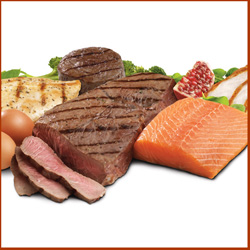
The insufficient intake of amino acids leads to protein degradation in muscles and tissues.
Amino acids are the building blocks of proteins. Twenty different amino acids are necessary for the formation of different proteins in the human body – they are important for the growth, regeneration and maintenance of body tissues and muscles. Eleven of those amino acids are produced by the body. The remaining nine (called essential or indispensable) are supplied by the food. The essential amino acids include isoleucine, leucine, lysine, methionine, phenylalanine, threonine, tryptophan and valine. Another amino acid – histidine, is considered semi-essential, because the body does not always need a food source to produce it. The nonessential amino acids are arginine, alanine, asparagine, aspartic acid, cysteine, glutamine, glutamic acid, glycine, proline, serine and tyrosine. Other amino acids like carnitine and taurine are used by the human organism in another way, not as a building block of protein. L-theanine helps fight stress. Beta-alanine is used for fatigue prevention during workouts.
What is the normal protein necessity?
Nutrition experts point out that protein, composed of amino acids, makes 10-12% of calories in a balanced diet. Nevertheless, protein necessity depends on age, weight, health status and other factors. Overall, an adult needs approximately 0.36 grammes of protein per kilogramme of body weight. Some athletes need more proteins than a normal individual.
Where can you find amino acids?
Essential amino acids can be added in a natural way through food. You will find them in poultry, fish, eggs, dairy products. Protein sources of plant origin often lack one or more essential amino acids. Yet this lack can be compensated by eating more and diverse vegetable foods. For example, cereals have low lysine content, while beans are rich in lysine. It was previously believed that in order to supply their organisms with enough proteins vegetarians had to try to bring a balanced quantity of amino acids to each meal. For example, cereals and beans had to be present in one and the same meal. However, new studies reveal that it is not obligatory to take all necessary amino acids in the same dish.
Insufficient intake of amino acids and consequences
Those who are put on a diet, most vegetarians as well as athletes most probably do not have sufficient intake of amino acids. In such cases the body begins to degrade the accumulated proteins in the muscles in order to supply organs with essential substances, making up for the deficiency. If athletes do not take additional quantities of amino acids, there is no way for their body to build up muscle mass despite repetitive workouts. That’s why in such cases it is recommended that amino acids should be taken as supplements after consultation with a physician.

















LEAVE A COMMENT :
Comments sort : Newest / Oldest / Most Upvoted